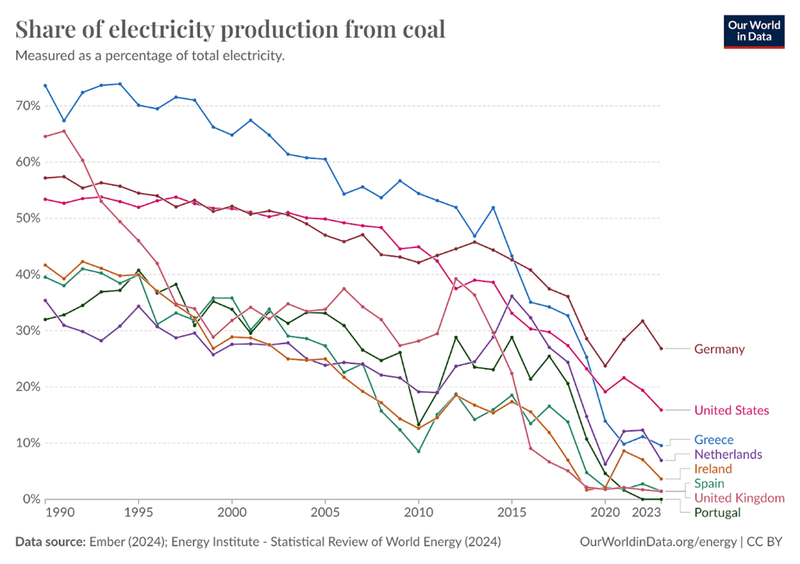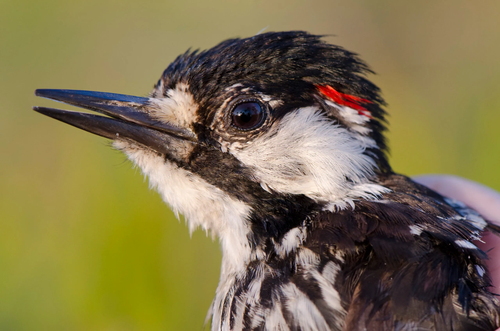A Gift Of Hope From 2024 T0 2025 - A Year Of Challenges And Progress
Monday, 27 January 2025By Patricia Lustig
“Hang on to your hat. Hang on to your hope. And wind the clock, for tomorrow is another day.” E.B. White

2024 was an … interesting year, containing both uncertainty and progress. Amidst the challenges, there were good reasons for hope.
This is important because when we are faced with feelings of uncertainty or threat, it’s easy to feel powerless: we feel that we cannot act or influence, that we have no say. Glimpses of progress can inspire action.
That is worth searching for. By building on these glimpses, we can generate more opportunities and shape a better future for all.
The End Of An Era: Coal Power In The UK
On 30 September 2024, the UK closed its last coal-fired power plant, marking the end of 142 years of coal-powered electricity generation. The UK’s energy generation profile is now coal free. The UK is the first G7 nation to eliminate coal-powered electricity generation (the UK was also the first to build a coal-fired power station.)
Coal power made up 80% of the UK’s electricity in the early 1980s and 40% in 2012 before petering out in the last decade due to costly carbon taxes and the rise of cheaper renewables.
Since October 2024, the UK’s coal-free energy profile is a powerful sign of global progress towards cleaner energy. Globally, coal use is trending downward: This Our World in Data provides a chart showing the decline of electricity produced by coal across Europe and the USA.

Globally, coal use is trending downward. This leads to hope that coal use – a significant contributor to global heating - will soon peak particularly with China’s usage now declining. Here is to the first (and dirtiest) fossil fuel which is likely to soon peak and decline.
A Breakthrough Year For Public Health
In January 2024, Cameroon became the first country to roll out routine malaria vaccinations, a milestone described as “a transformative chapter in Africa’s public health history”. The vaccine rollout has since scaled up across the continent with 17 countries now offering the RTS,S vaccination to children.
According to The World Health Organization, the vaccine has led to a 13% drop in child deaths in the countries administering it. Malaria claims approximately 600,000 lives annually – 80% of them children. It now has a formidable new adversary.
There is still no vaccine against HIV, but a game-changing drug emerged in 2024. Lenacapavir, developed by Gilead Sciences, provides six months protection against HIV per injection with 100% efficacy. Science named it the 2024 Breakthrough of the Year, highlighting its transformative potential in the fight against HIV.
Endangered Species Making a Comeback
Many endangered species showed remarkable recoveries this year, including:
- Saimaa ringed seal
- Scimitar oryx
- Red cockaded woodpecker

- Siamese crocodile
- Narwhal
- Arapaima (fish)
- Chipola slabshell and Fat three ridge (mussels)
- Iberian lynx
- Asiatic lions
- Australian saltwater crocodile
- Asian antelope
- Ulūlu
- Southern bluefin tuna
- Sierra Nevada yellow-legged frog
- Yellow-footed rock wallabies
- Yangtze finless porpoise
- Pookila
- Orange-bellied parrots
- Putitor mahseer (fish)
- Giant pandas
- Florida golden aster
From aquatic life to land mammals and birds, conservation efforts are yielding measurable success.
Democracy Surprises the World
More than two billion people went to the polls this year, and democracy showed resilience, faring better than most people expected, with solid voter turnout, although incumbent governments were punished in many places. Some highlights include:
- Indonesia: saw the world's biggest one day election
- India and South Africa: voters rejected the incumbent ruling parties, leading to coalition governments.
- South Korea: democratic institutions rejected authoritarianism
- Bangladesh: promised free and fair elections following a 'people's victory'
- Senegal, Sri Lanka and Botswana: Peaceful transitions of power ended decades of single-party rule.
Gene Editing Reaches Patients
Gene editing advanced significantly in 2024. The first commercial CRISPR treatment became available to sickle cell patients, and in vivo gene therapy was used for blood cancer. Researchers made strides in tackling HIV (see above) by ‘cutting’ HIV out of cells and developing DNA switches to precisely control gene expression. While costs remain high, these milestones signal a future where once intractable diseases become treatable.
Reasons to Celebrate
From health, conservation, civil society, energy and living standards to democracy and scientific breakthroughs, 2024 provided numerous reasons for hope. For a year with many reasons to doom-scroll, there was also much to celebrate.
I anticipate and hope that 2025 will surprise us (in a good way).
Patricia Lustig, January 2025